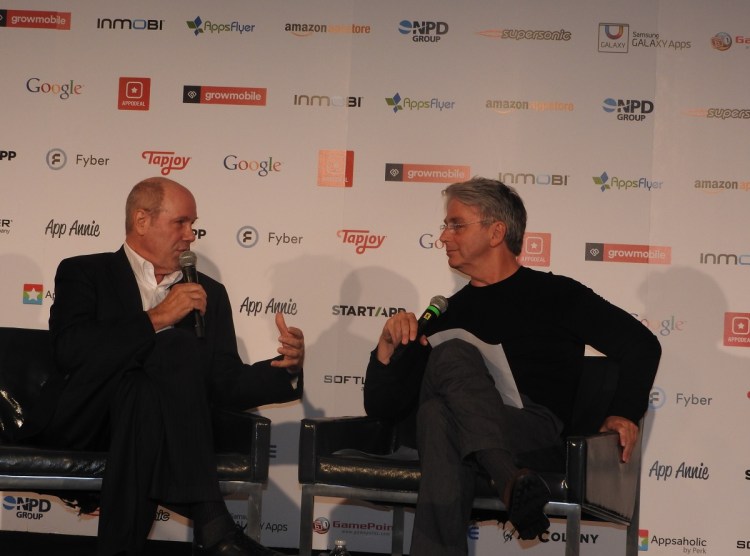SAN FRANCISCO — Michael Eisner, the founder of investment firm Tornante, the owner of Topps playing card company, and former chief executive of Disney, told an audience of game industry people today that content rules.
“With all due respect to Marshall McLuhan, the medium is not the message,” Eisner said in his talk that Unity Technologies CEO John Riccitiello moderated at the Casual Connect gaming conference. “The message is the medium.”
As an example, he pointed to The Lion King. The theatrical musical on Broadway alone earned more than $6 billion in revenues.
“It hasn’t even gone on Netflix yet,” he said. “Time and again, outstanding content will be successful.
“All sorts of people loved Scrabble on the table with people they knew. Now millions of people love Words With Friends with people they never met and may be on the other side of the planet. It’s the quality of the content that engaged them. Gutenberg could have stamped out something practical first. Instead, he printed the bible, often known as the greatest story ever told.”
He also pointed to Disney’s efforts to popularize Mickey Mouse and all sorts of other brands. In doing so, he brought up the famous “pontilist” paintings made of myriad numbers of dots. He thinks of those dots as little Mickey Mouse branded images, and that Disney is built of many of those dots. An example: The shampoo in the Disneyland Hotel has Mickey Mouse branding on it. Your job is the brand owner is to “mind the dots,” no matter how small.
And he noted, ABC is not a brand. The network consists of a bunch of shows that are brands, he said. He was cautious about Google changing its parent company to Alphabet, he said, “because Google is a brand.”
Can mobile games like Clash of Clans become a brand that will be known in 20 years? He said, “It could be a brand. But if people who made that brand try to be expedient and make a quick buck, then no, it will not be a brand.”
Interestingly, Riccitiello used to say in his own speeches that content is currently undervalued, and that if you added all the value of content companies up, they were worth nowhere near as much as the platform and technology companies, from Comcast to Google.
After the talk, I asked Eisner what he thought about the mismatch in valuations. He noted that investors believe that tech companies have room for infinite growth, while content companies may be mature or more limited, and that explains the difference in valuations.
As for his “go to apps” on his smartphone, Eisner quipped, “I”m pretty high on the flashlight. Amazon. Topps. Topps. I like the photo apps. The travel apps. Some of the game apps. I’m like a troglodyte running around asking people how to use my smartphone.”
Asked who he admires in content, Eisner said, “There’s two groups, like the one I grew up with doing amazing films still. A lot of the new talent is coming out of the Comedy Centrals, the Internet shows. We did 30 movies beginning with Prom Queen. We started doing things for 30 seconds, then 90 seconds. Then 5 minutes. Then 30 minutes on the Internet.”
He added,”Then Netflix came around and House of Cards. A lot of people come up behind you.”
Asked how he made bets on great content, Eisner said, “I have no idea.” It was a matter of hearing the best pitch from somebody else.
“If you take a great idea and do an extraordinary job with it, you will make cultural history,” he said. “If you take a bad idea, and do a bad job with it, it will fail. If you do an OK job with it, it will fail. If you do a great job with it, you will fail. Therefore, why waste your time? Do a great idea.”
At Topps, Eisner said he was proud the trading card company was adapting to the Internet by creating digital collectible cards where people could carry around their whole collection on a smartphone in their pockets.
He also insisted that creativity doesn’t have to be expensive.
“People try to shove more money at it, and time and again that is wrong,” he said.
He recalled a movie called Raise the Titanic, where a critic noted it would have been cheaper to lower the Atlantic. By contrast, he noted that he encourage George Lucas and Steven Spielberg to make Raiders of the Lost Ark on a smaller budget than they originally envisioned. It turned out to be the right approach, Eisner said.
“In my 21 years at Disney, we worked hard at marrying cost-effective filmmaking with cutting edge technology,” he said.
His advice for young people: “I wouldn’t think about the IPO. I wouldn’t think about getting rich. I would think about the thing you are creating.” Go back to the core idea, he said.
If Eisner were 25 today, he said, “If I had no children, I would want to be in New York. If I have children as I do, I would want to be in California. The rest, who cares?”
VentureBeat's mission is to be a digital town square for technical decision-makers to gain knowledge about transformative enterprise technology and transact. Learn More


